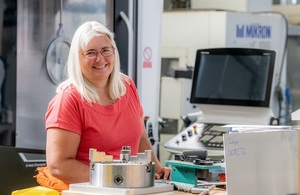Dstl careers: Julie, engineering
Championing diversity in engineering with a wealth of experience and passion.

Julie has 34 years of experience working in engineering roles at the Defensive Science and Technology Laboratory (Dstl) and is passionate about improving diversity in the field.
She’s been an apprentice, helped design and deliver an apprenticeship programme, and is now a Suitably Qualified Experience Persons (SQEP) Lead in Counter-terrorism and security (CTS) division.
“I joined Dstl’s predecessor in 1989 as an electronic apprentice, at a time when most others were men and the infrastructure and environment were not at all suited to women. Since then I have done a wide range of different engineering and safety roles.
“I’ve been at Dstl for over 34 years and have worked in Energetics, Novel Explosives and Munitions and I’ve been the Explosives Safety Officer and the Range Safety Officer.
“In 2016 I began working with industry to design, develop and deliver the Ordnance Munitions and Explosives apprenticeship programme to broaden the opportunity for people to pursue a career in the field. And today, I am the Technical Lead for the programme as part of my role as the SQEP Lead in CTS division.
“I’m proud to say that my work has been recognised in the BAE Chairman award in 2018 and has led to nominations for Woman in Defence and Apprentice Champion of the Year.”
Julie is dyslexic which she has learned to use to her advantage:
“I am dyslexic, which I now see as a superpower because it makes me a natural problem solver – something that makes me well suited to being an engineer. But as a child it was difficult because I was scored on my ability to write or understand written questions. This drew me to more practical subjects.
“My favourite hobbies as a child were Lego and modifying my bike, so once I worked out I could do an engineering apprenticeship, which was essentially putting my hobby skills to good use, I knew I had found my path.”
What Julie enjoys most about being an engineer is the ability to solve problems in such a broad environment:
“You never get bored, and if you do, there are always areas where your skills are needed. I really enjoy the variety of different people I work with and have worked with, some that think like me, and others that bring a different dimension and a whole set of skills I am in awe of.”
Julie also says she is “without a doubt” most proud of the Ordnance Munitions and Explosives apprenticeship pathway:
“Before the apprenticeship, the number of people building a career in energetics was tiny and unsustainable - it was only open to people that had done a degree. The apprenticeship creates an opportunity for a much wider and more diverse pool of people that perhaps didn’t consider going to university or a career in energetics, to have one.
“It provides them with a structured and measured learning journey, which is essential in this high hazard area, and it’s enabling us to grow our capability to make sure we have people with the right skills and expertise for the future.”
Julie also talks about International Women in Engineering Day which has been going for 10 years now (usually occurs in June) and celebrates women working in the industry:
“Engineering for women has come a long way since I was at school. I was actively discouraged from pursuing a career in it, which hasn’t been the case for my teenage daughters, but still many girls are put off engineering and science, technology, engineering and maths (STEM) subjects.
“It’s really important that we consider what more we can do to attract girls and women into engineering and this has to start in primary school. I think there needs to be a broader understanding of what engineering is, that it isn’t just fixing your VW Beetle or being good at maths or physics - for me it is so much more, it’s about solving problems, innovation and creativity to make life easier for people.
“There is a massive shortage of women engineers and scientists in the UK and we can’t afford to miss out on this valuable resource. Women bring a different perspective to the workplace and to deliver world leading science and technology, we need a diverse workforce.”
Find out about careers at Dstl and explore our current job opportunities.